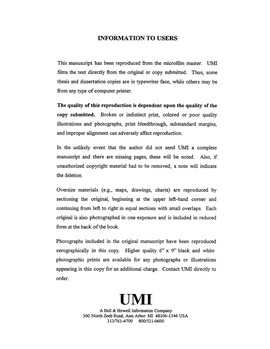| dc.contributor.advisor | Shalhope, Robert E., | en_US |
| dc.contributor.author | Foote, Lorien. | en_US |
| dc.date.accessioned | 2013-08-16T12:30:33Z | |
| dc.date.available | 2013-08-16T12:30:33Z | |
| dc.date.issued | 1999 | en_US |
| dc.identifier.uri | https://hdl.handle.net/11244/5819 | |
| dc.description.abstract | Francis George Shaw, son of a wealthy Whig merchant who helped build the commercial infrastructure of New England, retired from commerce at a young age. This action inaugurated a lifetime devoted to scholarship and reform in which Shaw became a central figure in a number of important reform movements meant to transform America's economic, intellectual, and cultural life. An early abolitionist, Shaw became convinced that the whole structure of American society was flawed. Disenchanted with the contrast between wealth and want in the emergent capitalistic society of the 1840's, Shaw embraced Association---a French socialist movement advocating communal ownership of property and cooperative work---as an alternative to American institutions. Although Association collapsed, Shaw took its principles and applied them to the work of Reconstruction during the 1860's. His leadership of the National Freedmen's Relief Association and the American Freedmen's Union Commission moved those organizations in a more radical direction and resulted in programs which were decidedly more egalitarian than those of other organizations wedded to a free labor ideology. When Reconstruction failed and northern society experienced the pangs of industrial depression in the 1870's, Shaw rejected the liberal reform and scientific charity movements that his colleagues embraced; he believed that Henry George's Progress and Poverty offered the solution to poverty. In George's work he recognized the fundamentally communal vision he had long sought; one that promised a great cooperative society in which the government administered the benefits of shared property for the common good. Shaw's financial support and intellectual partnership were indispensable in promoting George's ideas throughout the Anglo-American world. Shaw thus became the vital link in American thought between the antebellum tradition of communalism and its late-nineteenth-century resurgence. Once again Shaw fulfilled the role he had played for so long and so well in American reform: he served as an essential conduit for reform currents surging through American society. | en_US |
| dc.format.extent | vi, 282 leaves ; | en_US |
| dc.subject | History, United States. | en_US |
| dc.subject | Shaw, Francis George, 1809-1882. | en_US |
| dc.title | Seeking the one great remedy: Francis George Shaw and nineteenth-century reform. | en_US |
| dc.type | Thesis | en_US |
| dc.thesis.degree | Ph.D. | en_US |
| dc.thesis.degreeDiscipline | Department of History | en_US |
| dc.note | Source: Dissertation Abstracts International, Volume: 60-05, Section: A, page: 1724. | en_US |
| dc.note | Major Professor: Robert E. Shalhope. | en_US |
| ou.identifier | (UMI)AAI9930836 | en_US |
| ou.group | College of Arts and Sciences::Department of History | |
